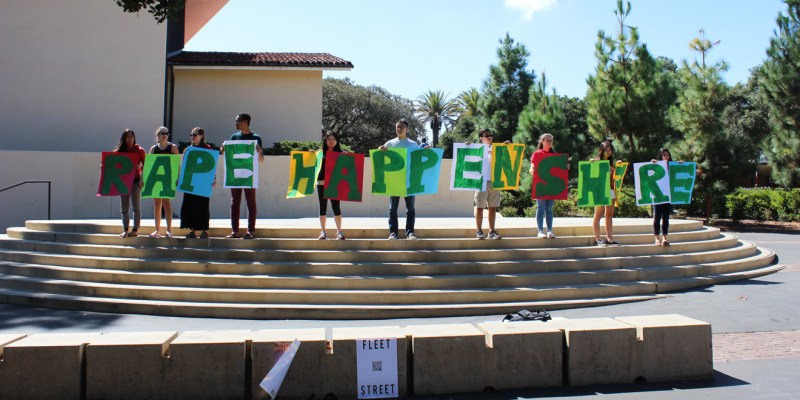Following accusations of lenient sentencing in the Brock Turner case, California legislators on June 20 introduced Assembly Bill 2888, which would effectively mandate a minimum sentence of three years in prison for those convicted of sexual assault. Senator Jerry Hill (D-San Mateo), Assemblymen Evan Low (D-Campbell) and Bill Dodd (D-Napa) are the three Northern Californian legislators behind the bill.
“What we’re doing is saying [that] regardless of whether the victim is intoxicated, a rapist has to go to jail and can’t just get off with a slap on the wrist,” Low said in an email to The Daily. “Rape is rape, plain and simple. We have a rape epidemic on our college campuses right now and we need to stand up and say no more.”
In the January 2015 assault, Turner was convicted of three felonies: assault with the intent to commit rape, sexual penetration with a foreign object of an intoxicated person and sexual penetration with a foreign object of an unconscious person. Santa Clara County Superior Court Judge Aaron Persky ’84 M.A. ’85 sentenced him to a six month term in county jail and three years probation on June 2.
The current state law mandates a state prison term of three, six or eight years for rape, which is defined as “nonconsensual sexual intercourse accomplished by force,” according to California Penal Code Section 261. According to Low, this definition of rape, condemned by several California lawmakers as archaic, does not include penetration of any kind without consent, thereby creating a loophole for sex offenders like Turner.
Furthermore, according to Low, a rapist has to “have used force” to trigger a mandatory prison sentence. But if a victim is unconscious or severely intoxicated, then the rapist doesn’t have to use force, Low said.
According to Stanford Law School’s William H. Neukom Professor of Law Mark Lemley, the current law also attempts to set a minimum prison sentence in cases of sex crimes. But judges can, as Persky did in the Turner case, “avoid that result by citing extraordinary circumstances and the interests of justice,” Lemley said.
“AB 2888 is an effort to make clearer that the intended punishment for rape and sexual assault of an unconscious person is prison, not probation,” he said.
Deputy Public Defender Sajid Khan, an opponent of AB 2888, defends Persky’s sentence in an article for the National Association for Public Defense (NAPD):
Mass incarceration is largely a result of judges who have either not utilized discretion in sentencing or who have been deprived by state legislatures of discretion. This lack of discretion has manifested in draconian sentences and overfilled prisons. Rather than using robotic, one-size-fits-all punishment schemes, we want judges, like Judge Persky, to engage in thoughtful, case-by-case, individualized determinations of the appropriate sentence for a particular crime and particular offender.
Low, however, disagrees with accusations of mass incarceration. He expects the bill to impact 100-200 sexual assault cases currently being adjudicated in California, but believes that “100-200 cases would not imply mass incarceration” and that “anyone who has raised this as a concern is simply trying to avoid the issue at hand,” he said.
Several Stanford professors, on the other hand, are less interested in new legislation and more focused on recalling Persky.
Stanford Law School’s Frederick I. Richman Professor of Law Michele Dauber believes that “changing the law won’t do anything to hold Judge Persky accountable and won’t do anything about the fact that [Persky] is biased,” she said.
“Honestly, I think that Persky’s decision on the Turner case abused his discretion,” Dauber said. “I don’t think the answer is taking away discretion from a thousand good judges in order to deal with the problem of one bad judge. The solution is to elect a different judge.”
Referencing the De Anza Community College gang rape case that Persky presided over, Dauber accused Persky of “bending over backwards to help [the perpetrators] out and giving them every opportunity not to be found responsible,” she said.
Dauber helped establish a campaign to recall Persky, which is endorsed by the Progressive Women of Silicon Valley. The movement has since raised $300,000; GRLCVLT, a nationwide secret society promoting justice for women, is one of its major donors and will be holding a benefit concert for the campaign on Aug. 1 in Brooklyn.
“I don’t want victims [to be with] a judge who isn’t compassionate about sexual assault, who doesn’t understand the trauma and isn’t going to take the crime seriously,” Dauber added.
In his article for The Guardian, David Palumbo-Liu, professor of comparative literature, also endorses the recall campaign, citing the Ramirez case as evidence of racial and class bias on Persky’s part. Raul Ramirez, an immigrant from San Salvador who was convicted of sexually assaulting his female roommate in a case similar to Turner’s, was sentenced by Persky to three years in state prison.
“Judicial discretion can only be entrusted to judges who will exercise it fairly in all cases,” Palumbo-Liu wrote in his piece for The Guardian. “The road to reform that protects the rights of all of those caught up in the criminal justice system — men and women, white and nonwhite, poor and privileged — has to be a willingness to root out bias wherever it exists.”
Contact Karissa Dong at karissadong ‘at’ gmail.com and Rachel Zhang at rachel.m.zhang ‘at’ gmail.com.
